
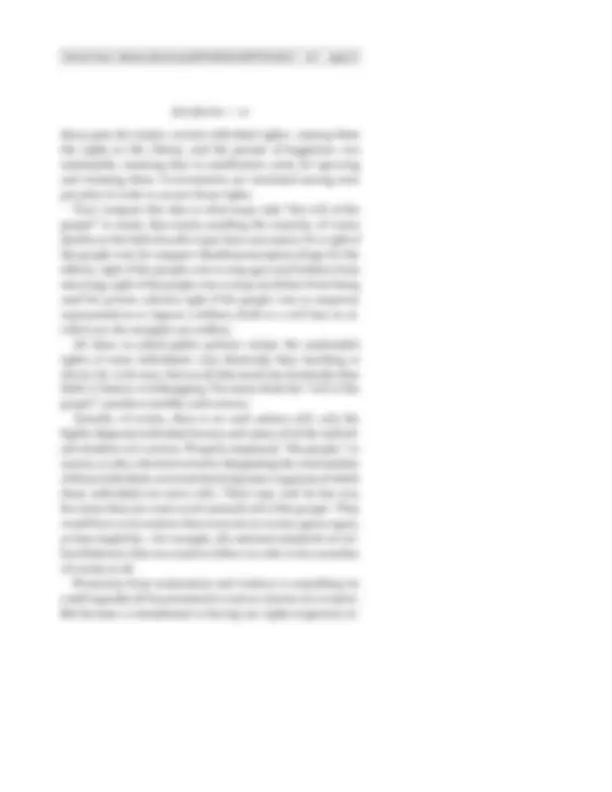
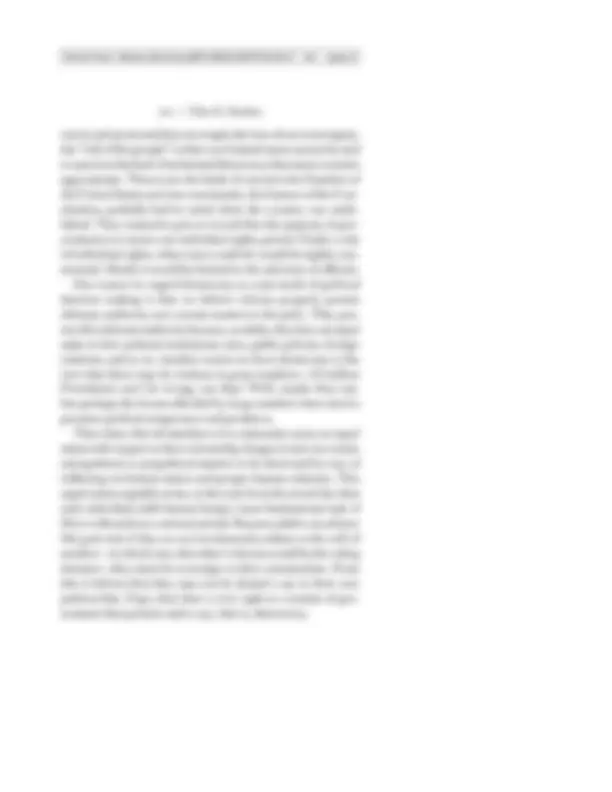
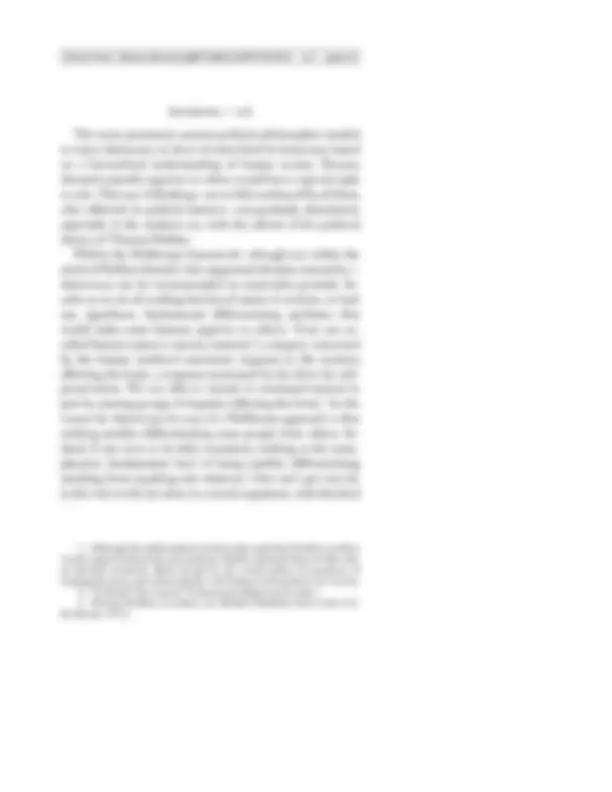
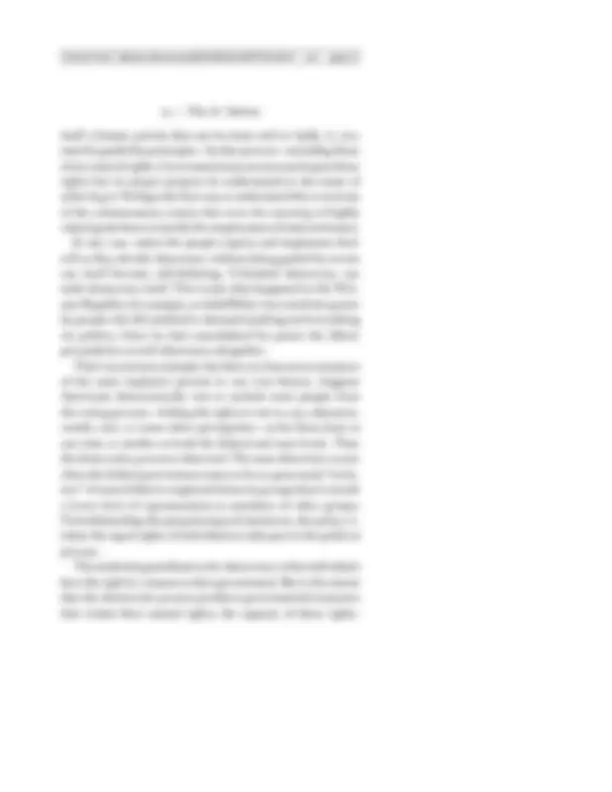
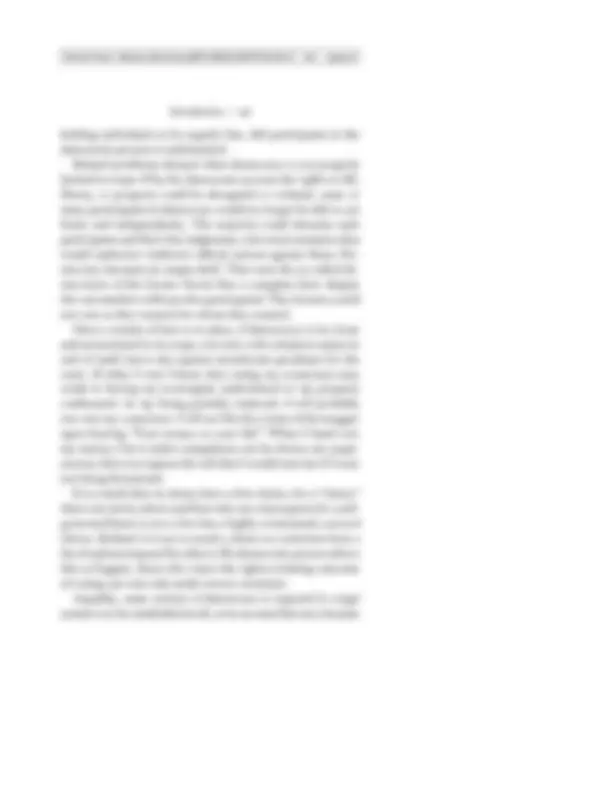
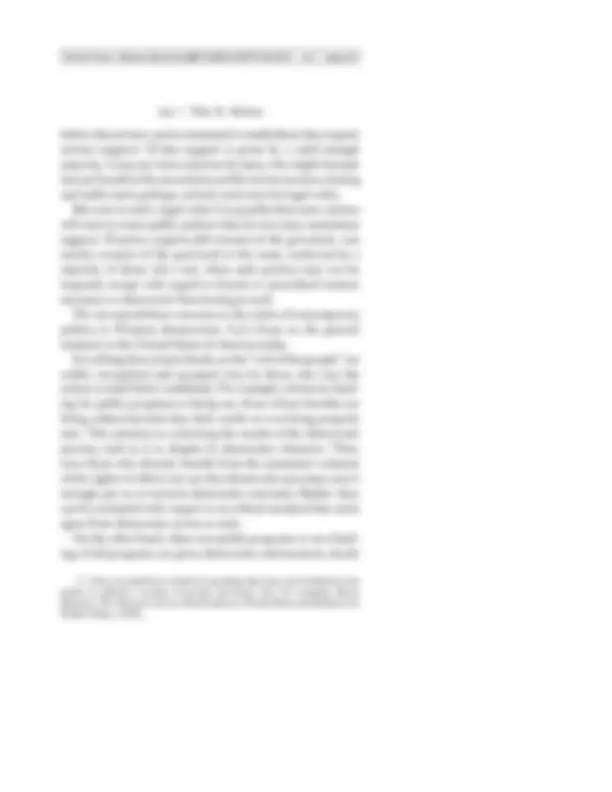
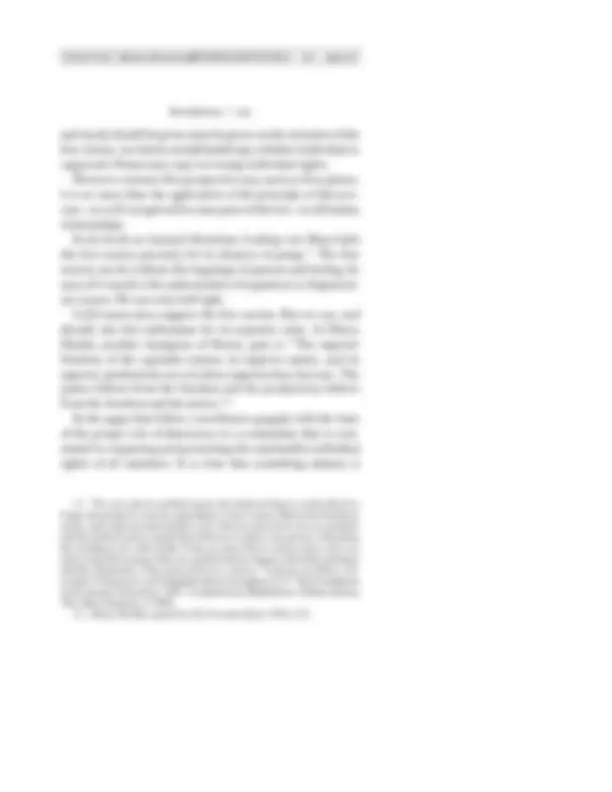



Study with the several resources on Docsity

Earn points by helping other students or get them with a premium plan


Prepare for your exams
Study with the several resources on Docsity

Earn points to download
Earn points by helping other students or get them with a premium plan
Community
Ask the community for help and clear up your study doubts
Discover the best universities in your country according to Docsity users
Free resources
Download our free guides on studying techniques, anxiety management strategies, and thesis advice from Docsity tutors
The philosophical foundations of democracy, discussing the differing perspectives of Rousseau, Locke, and Hobbes on the concept of 'the will of the people' and the role of individual rights in democratic decision-making. It also delves into the potential dangers of unlimited democracy and the importance of due process and natural rights.
Typology: Study notes
1 / 14

This page cannot be seen from the preview
Don't miss anything!









introduction
these days almost everybody believes in democracy. But not everybody agrees on just what democracy is. Literally, the term means “the rule of the people.” Demos is Greek for “people,” and kratos is Greek for strength or power, derivatively, “rule.” Hence, democracy empowers the people to rule. Yet this etymological excursion hardly settles the matter, for there remains the question of what exactly constitutes “the people.” The concept could simply be a shorthand way of re- ferring to everyone individually. Or it could refer to an entity that comprises all these individuals but that is somehow greater than the sum of the parts and possessive of a life unto itself.^1 In the days following the 2000 U.S. presidential election, when much of America was on pins and needles over the issue of the electoral count in Florida, there was a good deal of rhetoric about “the will of the people.” Political partisans ap-
Hoover Press : Machan (Democracy)DP5 HMACLDINTR 05-06-01 rev1 page xiii
peared on television to tell us they wanted to make sure the electoral process accurately expressed “the will of the people.” By this they apparently meant that they wanted an accurate accounting of how the majority of voters had in fact voted. But does such an accounting really inform us of the “will of the people”? And even if it does, are candidates then obliged to enact this transcribed “will of the people,” whatever that is supposed to be, once they take office? It all depends. If “the people” designates some entity over and above the individuals who compose it, then this entity may indeed possess a single will of some kind or another, and it may indeed be vital for us to know what this will is.^2 But it may not be a good idea to always obey this alleged will. We know, for example, that lynching an accused person and supporting an inhumane institution, such as slavery, are just plain wrong even if such choices are the will of the majority. Even if they make those choices democratically, via their votes. Democracy cannot supersede ethics. It is not beyond good and evil. The necessity of constraining the majority from doing wrong is an underlying principle of the Bill of Rights. If each particular individual who is a constituent of “the people” has rights, he has those rights even if most of his neighbors are eager to violate them; therefore, they may be institutionally prevented from so violating them. A right is a constraint on others. If that con- straint is justified, it’s justified no matter how large the number of those others happens to be. As the Declaration of Indepen-
Hoover Press : Machan (Democracy)DP5 HMACLDINTR 05-06-01 rev1 page xiv
xiv / Tibor R. Machan
cured, and protected does not imply the loss of our sovereignty, the “will of the people” in that very limited sense cannot be said to sanction the kind of unlimited democracy that many societies approximate. These were the kinds of concerns the founders of the United States and, less consistently, the framers of the Con- stitution probably had in mind when the country was estab- lished. They wanted to put on record that the purpose of gov- ernment is to secure our individual rights, period. Under a rule of individual rights, what voters could do would be tightly con- strained. Mostly it would be limited to the selection of officials. One reason we regard democracy as a just mode of political decision making is that we believe citizens properly possess ultimate authority over certain matters in the polis. They pos- sess this ultimate authority because, as adults, they have an equal stake in their political institutions, laws, public policies, foreign relations, and so on. Another reason we favor democracy is the view that there may be wisdom in great numbers—50 million Frenchman can’t be wrong, can they? Well, maybe they can, but perhaps the forum afforded by large numbers does tend to promote political temperance and prudence. That claim, that all members of a community enjoy an equal status with respect to their citizenship, hinges in turn on certain extrapolitical or prepolitical matters to be discerned by way of reflecting on human nature and proper human relations. This equal status arguably arises, in the end, from the moral fact that each individual adult human being’s most fundamental task of life is to flourish as a rational animal. Because adults can achieve this goal only if they are not involuntarily subject to the will of another—in which case, that other’s choices would be the ruling element—they must be sovereign in their communities. From this it follows that they may not be denied a say in their own political fate. Ergo, they have a civic right to a system of gov- ernment that permits such a say, that is, democracy.
Hoover Press : Machan (Democracy)DP5 HMACLDINTR 05-06-01 rev1 page xvi
xvi / Tibor R. Machan
The most prominent ancient political philosophers tended to reject democracy in favor of some kind of aristocracy based on a hierarchical understanding of human society. Persons deemed naturally superior to others would have a special right to rule. This way of thinking—never fully embraced by all those who reflected on political matters—was gradually abandoned, especially in the modern era, with the advent of the political theory of Thomas Hobbes. Within the Hobbesian framework—though not within the mind of Hobbes himself, who supported absolute monarchy— democracy can be recommended on materialist grounds. In- sofar as we are all nothing but bits of matter in motion, we lack any significant, fundamental differentiating attributes that would make some humans superior to others.^3 Even our so- called human nature is merely nominal,^4 a category concocted by the human intellect’s automatic response to the motions affecting the brain, a response motivated by the drive for self- preservation. We are able to remain in continued motion in part by naming groups of impulses affecting the brain.^5 So the reason for democracy by way of a Hobbesian approach is that nothing justifies differentiating some people from others. In- deed, if one were to be fully consistent, nothing at the meta- physical, fundamental level of being justifies differentiating anything from anything else whatever. One can’t get very far in the real world, let alone in a moral argument, with this kind
Hoover Press : Machan (Democracy)DP5 HMACLDINTR 05-06-01 rev1 page xvii
Introduction / xvii
In this light, democracy is morally required by the right to take part in political decisions and the right to give consent to governance. It is our natural right to person and estate that warrants our right to political participation. But the democratic process cannot be applied to everything under the sun one might want to influence. That is to say, democracy has a proper sphere. Clearly, some disagree. Some do believe (at least some of the time) that democracy should be unlimited and all that matters is whether “the people” will things to be one way versus another way. Even some interpreters of Locke, for example, Wilmore Kendall and his followers, as well as some recent conserva- tives, for example, Robert Bork, have dared to claim this.^7 They argue that once human beings have emerged from a state of nature, they have in effect adopted democracy as a decision- making process regarding whatever comes up for public dis- cussion. It is hardly clear that Locke can be coherently interpreted this way, but in any case, the assumption of unlimited democ- racy is wrongheaded. For in Locke, the justification for govern- ment lies in the need to protect our natural rights, a protection not easily obtained (except by the strong) in the state of nature.^8 Because establishing, maintaining, and protecting our rights is
Hoover Press : Machan (Democracy)DP5 HMACLDINTR 05-06-01 rev1 page xix
Introduction / xix
itself a human activity that can be done well or badly, it, too, must be guided by principles—by due process—including those of our natural rights. Government may not encroach upon those rights lest its proper purpose be undermined in the name of achieving it. Perhaps the best way to understand this is in terms of the commonsense notion that even the securing of highly valued goals does not justify the employment of immoral means. In any case, unless the people express and implement their will as they should, democracy without being guided by norms can itself become self-defeating. Unlimited democracy can undo democracy itself. This is just what happened in the Wei- mar Republic, for example, as Adolf Hitler was voted into power by people who felt entitled to demand anything and everything via politics. Once he had consolidated his power the fu¨ hrer proceeded to scotch democracy altogether. That’s an extreme example, but there are less severe instances of the same implosive process in our own history. Suppose Americans democratically vote to exclude some people from the voting process—linking the right to vote to, say, education, wealth, race, or some other prerequisite—as has been done at one time or another at both the federal and state levels. Then the democratic process is distorted. The same distortion occurs when the federal government essays to be so generously “inclu- sive” of some hitherto-neglected minority groups that it awards a lower level of representation to members of other groups. Notwithstanding the purported good intentions, the policy vi- olates the equal rights of individuals to take part in the political process. The underlying justification for democracy is that individuals have the right to consent to their government. But to the extent that the democratic process produces governmental measures that violate their natural rights, the capacity of these rights-
Hoover Press : Machan (Democracy)DP5 HMACLDINTR 05-06-01 rev1 page xx
xx / Tibor R. Machan
before decent laws can be instituted or established, they require serious support.^9 If that support is given by a solid enough majority, it may (a) resist rejection by many who might hesitate but see benefit in the association and (b) set into motion a lasting and stable (and, perhaps, entirely noncoercive) legal order. But even in such a legal order it is possible that some citizens will want to enact public policies that do not enjoy unanimous support. If justice requires full consent of the governed—not merely consent of the governed in the sense conferred by a majority of those who vote—then such policies may not be imposed, except with regard to formal or procedural matters necessary to democratic functioning as such. We can extend these concerns to the realm of contemporary politics in Western democracies. Let’s focus on the general situation in the United States of America today. It is telling that certain checks on the “will of the people” are widely recognized and accepted even by those who toss the notion around fairly confidently. For example, whenever fund- ing for public programs is being cut, those whose benefits are being reduced protest that their needs are not being properly met. This amounts to criticizing the results of the democratic process, such as it is, despite its democratic character. Thus, even those who directly benefit from the systematic violation of the rights of others can see that democratic processes aren’t enough, per se, to warrant democratic outcomes. Rather, they can be evaluated with respect to an ethical standard that exists apart from democratic norms as such. On the other hand, when new public programs or new fund- ing of old programs are given democratic endorsement, clearly
Hoover Press : Machan (Democracy)DP5 HMACLDINTR 05-06-01 rev1 page xxii
xxii / Tibor R. Machan
diminishing the well-being of those who must pay for them with higher taxes, the same crew contends that inasmuch as this wealth transference is simply the result of democracy, any com- plaints must be unjustified. As the point is usually put: “We” have decided to fund social security, unemployment compen- sation, the national parks, public broadcasting, or whatnot— haven’t we? If the results of democratic process are per se justified, how can it be okay to violate the individual rights to liberty and property of millions of people merely because “we” have dem- ocratically decided to do so but not okay to trim the benefits of handout recipients if a somewhat differently configured lot of us decide, democratically, to do that? The contradiction can’t be genuinely resolved, but it is often argued that in those cases where the outcomes aren’t the desired outcomes, something in the democratic process must have “gone wrong.” People must have been hoodwinked or been suffering from a false conscious- ness that impaired their judgment when they entered the polling booth.^10 In point of fact, for most of those who support what has come to be called strong democracy, democracy is merely a conve- nient path to the redistribution of wealth, a handy means of transforming plain theft into bland and dignified public policy. That’s why, when democracy produces a result that hampers such redistribution, democratic themes are suddenly inade- quate. What is true is that there must always be some specification
Hoover Press : Machan (Democracy)DP5 HMACLDINTR 05-06-01 rev1 page xxiii
Introduction / xxiii
and needy should be given must be given on the initiative of the free citizen, via charity and philanthropy, whether individual or organized. Democracy may not trump individual rights. However extreme this perspective may seem at first glance, it is no more than the application of the principle of due pro- cess—so well recognized in some parts of the law—to all human relationships. In his book on classical liberalism, Ludwig von Mises hails the free society precisely for its absence of pomp.^11 The free society can do without the trappings of passion and feeling, he says; all it needs is the endorsement of argument or dispassion- ate reason. He was only half right. Cold reason does support the free society. But we can, and should, also feel enthusiasm for its supreme value. As Henry Hazlitt, another champion of liberty, puts it: “The superior freedom of the capitalist system, its superior justice, and its superior productivity are not three superiorities, but one. The justice follows from the freedom and the productivity follows from the freedom and the justice.”^12 In the pages that follow, contributors grapple with the issue of the proper role of democracy in a community that is com- mitted to respecting and protecting the unalienable individual rights of all members. It is clear that something salutary is
Hoover Press : Machan (Democracy)DP5 HMACLDINTR 05-06-01 rev1 page xxv
Introduction / xxv
involved when a society is democratic rather than dictatorial or despotic. What exactly this is, and how it meshes with a free society’s uncompromising support of individual sovereignty, is the focus of this volume.
Hoover Press : Machan (Democracy)DP5 HMACLDINTR 05-06-01 rev1 page xxvi
xxvi / Tibor R. Machan